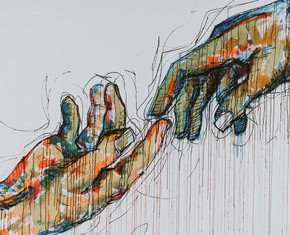The views expressed in our content reflect individual perspectives and do not represent the authoritative views of the Baha'i Faith.
A while ago, out hiking in the mountains, I saw the shadow of something large pass in front of me on the trail. I looked up. Soaring overhead, silent and huge, a golden eagle looked down. Our eyes caught for just a second. The sudden beauty of that regal raptor flying above me took my breath away. My heart leapt in my chest. In that unexpected instant of grace and connection I felt joyous, alive, one with the natural world, and truly inspired by the eagle’s beauty and nobility. (Also, I felt thankful I wasn’t a mouse.)
That momentary, exhilarating encounter made me wonder – where did the word “inspire” come from?
If you guessed, or knew, that the word “inspire” relates to the words “aspire” and “expire,” you’re absolutely right. It turns out that the root of inspire – the Latin word inspīr – comes from inspīrāre, which means “to breathe into.”
I passionately love and have always tried to seek inspiration in life, so indulge me for a minute with a few of the definitions of the word inspire:
- To infuse an animating, quickening or exalting influence into;
- To produce or arouse a feeling
- To influence or impel creatively
- To animate, as an influence, feeling or thought
- To communicate, guide or suggest by a divine or supernatural influence
- To give rise to, bring about or cause
- To breathe into or upon, to inhale
When we have an inspiration, the ancients tell us in their unique way, we are “breathed upon by God.” Maybe that’s why we say “it took my breath away” when we feel truly inspired.
 This uniquely human condition – the capacity and capability for inspiration and the great art that can result – occurs to no other living thing. As people, we universally search for inspiration every day. Children love the wonder and surprise of a sudden inspiring moment. We all have an innate desire for beauty, and a gorgeous sunset or a babbling mountain stream or the innocent smile of a small child can delight and inspire us. In our work, inspiration can fuel innovation and progress. In our creative endeavors, the artists among us make life inspiring by reaching for meaning and emotional resonance and soulful expression.
This uniquely human condition – the capacity and capability for inspiration and the great art that can result – occurs to no other living thing. As people, we universally search for inspiration every day. Children love the wonder and surprise of a sudden inspiring moment. We all have an innate desire for beauty, and a gorgeous sunset or a babbling mountain stream or the innocent smile of a small child can delight and inspire us. In our work, inspiration can fuel innovation and progress. In our creative endeavors, the artists among us make life inspiring by reaching for meaning and emotional resonance and soulful expression.
So where does inspiration come from?
It can happen suddenly in nature, as it did with that soaring eagle. It can happen in deep contemplation and reflection, when a new idea blooms out of the fertile human imagination. It can happen in the creative process, when we paint or sing or dance or sculpt. It can occur to us in dreams. It can strike us when we pray or read from the holy writings of the world’s Faiths.
The ancient Greeks believed they got their inspiration from the Muses, the nine mythical daughters of Zeus and Mnemosyne, the goddess of memory. The Greeks thought those nine Muses – Calliope, Clio, Erato, Euterpe, Melpomene, Polyhymnia, Terpsichore, Thalia and Urania – inspired human beings in all forms of knowledge and creative endeavor, including art, drama, geography, mathematics, philosophy, and of course music, that soul-stirring art named after the Muses themselves. Today the Muses are still with us: we muse when we think and meditate; we enjoy amusements; we seek knowledge in museums.
The Greeks said that you would feel the breath of the muse if she found your creative spirit worthy.
The holy scriptures of just about every great Faith use this same breath-centered language of inspiration, too:
With attentive mind he breathes in, with attentive mind he breathes out. – Buddha, the Word, The Eightfold Path.
And the Lord God formed man of the dust of the ground, and breathed into his nostrils the breath of life; and man became a living soul. – The Torah, Genesis, 2:77.
The spirit of God hath made me, and the breath of the Almighty hath given me life. – The King James Bible, Job 33:4.
Know thou of a certainty that Love is the secret of God’s holy Dispensation, the manifestation of the All-Merciful, the fountain of spiritual outpourings. Love is heaven’s kindly light, the Holy Spirit’s eternal breath that vivifieth the human soul. – Abdu’l-Baha, Selections from the Writings of Abdu’l-Baha, p. 27.
With that short summary as a background for our exploration of the phenomena of inspiration, this series of essays focuses on how we become inspired – how we can sense what Abdu’l-Baha calls “the Holy Spirit’s eternal breath” – and how we might seek and sustain it.
















Comments
Sign in or create an account
Continue with Googleor